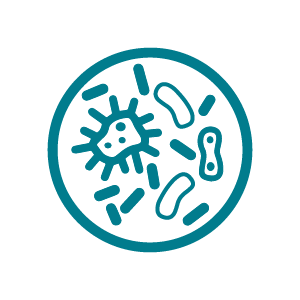

Programme Scope
The UKOTs exhibit a wide range of capacities and resource availability which can render some susceptible to emerging infectious diseases and to the importation of AMR through travellers and tourism, to residents returning from abroad.
Workstream Focus
-
Detection of antibiotic resistance in health care laboratories
-
Improving antibiotic prescribing through guideline development and professional development
-
Improving surveillance of AMR and the flow of data from laboratory.
-
Supporting infection prevention and control.
Example Projects
-
Laboratory support in detection of AMR by standard methods and by molecular means.
-
Rollout of the Microguide app to all UKOTs for appropriate empirical antibiotic guidelines for primary and secondary care – the first step in supporting the UKOTs in their AMS strategies.
-
Supported increased syndromic diagnostic capacity to enable UKOTs to identify pathogens in enteric, respiratory, neurological and bloodstream infections quickly and accurately to make a difference in the management of outbreaks and the management of individual patients.
-
A situational analysis of the current state of the national antimicrobial stewardship strategy across UKOTs.
Networks
IPC & AMR and Laboratory networks
Two key UKOT networks have evolved through this workstream: the Laboratory Network and the Infection Prevention Control (IPC) and Antimicrobial Resistance (AMR) network.
The IPC and AMR network is for UKOT IPC and AMR focal points, leads and practitioners, including those where IPC or AMR is just part of their remit in any setting (national, facility or community). Membership is also open to other stakeholders on request. The purpose of the network is to:
-
Provide peer support for IPC and AMR leads and practitioners
-
Facilitate shared learning between organisations and the UKOTs
-
Advance the development of improved IPC and AMR practices within the UKOTs
-
Provide a safe forum for discussing challenges and possible solutions
-
Facilitate training and educational opportunities
The Network meets every 6-8 weeks with the Secretariat provided by UKHSA, chaired by UKHSA IPC Specialist. For more information or to join the UKOTs IPC & AMR Network please email UKOTs.Programme@ukhsa.gov.uk.
Key Resources
-
BSAC Global Antimicrobial Stewardship Accreditation Scheme: https://bsac.org.uk/global-antimicrobial-stewardship-accreditation-scheme/
-
DHSC UK 5-year action plan for antimicrobial resistance: https://www.gov.uk/government/publications/uk-5-year-action-plan-for-antimicrobial-resistance-2019-to-2024
-
WHO Global Framework for Development and Stewardship to Combat Antimicrobial Resistance: https://www.who.int/groups/framework-development-stewardship-AMR
Previous Section | Top of Page | Next Section